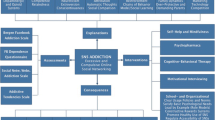Abstract
Vallerand et al. (2003) have proposed that individuals can have two distinct types of passion toward an activity. Harmonious passion, an internal force leading one to choose to engage in the activity, is proposed to be associated with positive consequences. Obsessive passion, an internal pressure forcing one to engage in an activity, is posited to be associated with negative consequences. The present study sought to determine the role of the two types of passion in various cognitive and affective states associated with dependence and problems with gambling. Participants (n = 412) were recruited at the Montréal Casino and given a questionnaire measuring passion toward gambling, as well as consequences associated with dependence and problem gambling. Results showed that obsessive passion for gambling predicted poorer vitality and concentration in daily tasks, as well as increased rumination, anxiety, negative mood, guilt, and problem gambling. These relations were not found for harmonious passion for gambling. Results are discussed in light of the motivational approach to passion (Vallerand et al., 2003).
Similar content being viewed by others
REFERENCES
Adams, J., & Kirby, R.J. (1997). Exercice dependence, injury, and anxiety in aerobic participants. In Lindor, R. & Bar-Eli, M. (Eds), Innovations in sport psychology: Linking theory and practice: Proceedings (pp. 56-58). Netany: The Zimmerman College of Physical Education and Sport Sciences, The Wingate Institute of Physical Education and Sport.
American Psychiatric Association. (1994). Diagnostic and statistical manual of mental disorders (4th ed.). Washington, DC: American Psychiatric Association.
Conboy, J.K. (1994). The effects of exercise withdrawal on mood states in runners. Journal of of Sport Behavior, 17, 188-302.
Lesieur, H.R. (1984). The chase: Career of the compulsive gambler. Cambridge, MA: Schenkman Books.
Lesieur, H.R., & Blume, S.B. (1987). The South Oaks Gambling Screen (The SOGS): A new instrument for the identification of pathological gamblers. American Journal of Psychiatry, 144, 1184-1188.
Lesieur, H.R., & Blume, S.B. (1993). Revising the South Oaks Gambling Screen in different settings. Journal of Gambling Studies, 9, 213-223.
Mageau, G.A., Vallerand, R.J., Rousseau, F.L., Ratelle, C.F., & Provencher, P.J. (in press). Passion and gambling: Investigating the divergent affective and cognitive consequences of gambling. Journal of Applied Social Psychology.
Orford, J., & McCartney, J. (1990). Is excessive gambling seen as a form of dependence? Evidence from the community and the clinic. Journal of Gambling Studies, 6, 139-152.
Rosenthal, R.J. (1992). Pathological gambling. Psychiatric Annals, 22, 72-78.
Rosenthal, R.J., & Lorenz, V.C. (1992). The pathological gambler as criminal offender: Comments on evaluation and treatment. Psychiatric Clinics of North America, 15, 647-660.
Rousseau, F. L., Vallerand, R. J., Le Martret, K., & Clark, M. (1999, November). Passion and subjective well-being among nursing home residents. Poster session presented at the 28th Annual Scientific and Educational Meeting of the Canadian Association on Gerontology, Ottawa, Canada.
Rousseau, F.L., Vallerand, R.J., Ratelle, C.F., Mageau, G.A., & Provencher, P.J. (2002). Passion and gambling: On the validation of the Gambling Passion Scale (GPS). Journal of Gambling Studies, 18, 45-66.
Ryan, R.M., & Frederick, C. (1997). On energy, personality, and health: Subjective vitality as a dynamic reflection of well-being. Journal of Personality, 65, 529-565.
Séguin-Lévesque, C., Laliberté, M.-L., N., Pelletier, L.G., Blanchard, C.M., & Vallerand, R.J. (2003). Harmonious and obsessive passion for the Internet: Their associations with couple's relationships. Journal of Applied Social Psychology, 33, 197-221.
Vallerand, R.J., Blais, M.R., Brière, N.M., & Pelletier, L.G. (1989). Construction et validation de l'Echelle de motivation en éducation (EME) [On the construction and validation of the French form of the Academic Motivation Scale]. Canadian Journal of Behavioural Science, 21, 323-349.
Vallerand, R.J., Blanchard, C., Mageau, G.A., Koestner, R., Ratelle, C.F., Leonard, M., Gagné, M., & Marsolais, J. (2003). Les passions de l'âme: On obsessive and harmonious passions. Journal of Personality and Social Psychology, 85, 756-767.
Walker, M.B. (1992). The psychology of gambling: International series in experimental social psychology. Oxford, UK: Pergamon Press.
Author information
Authors and Affiliations
Corresponding author
Rights and permissions
About this article
Cite this article
Ratelle, C.F., Vallerand, R.J., Mageau, G.A. et al. When Passion Leads to Problematic Outcomes: A Look at Gambling. J Gambl Stud 20, 105–119 (2004). https://doi.org/10.1023/B:JOGS.0000022304.96042.e6
Issue Date:
DOI: https://doi.org/10.1023/B:JOGS.0000022304.96042.e6




